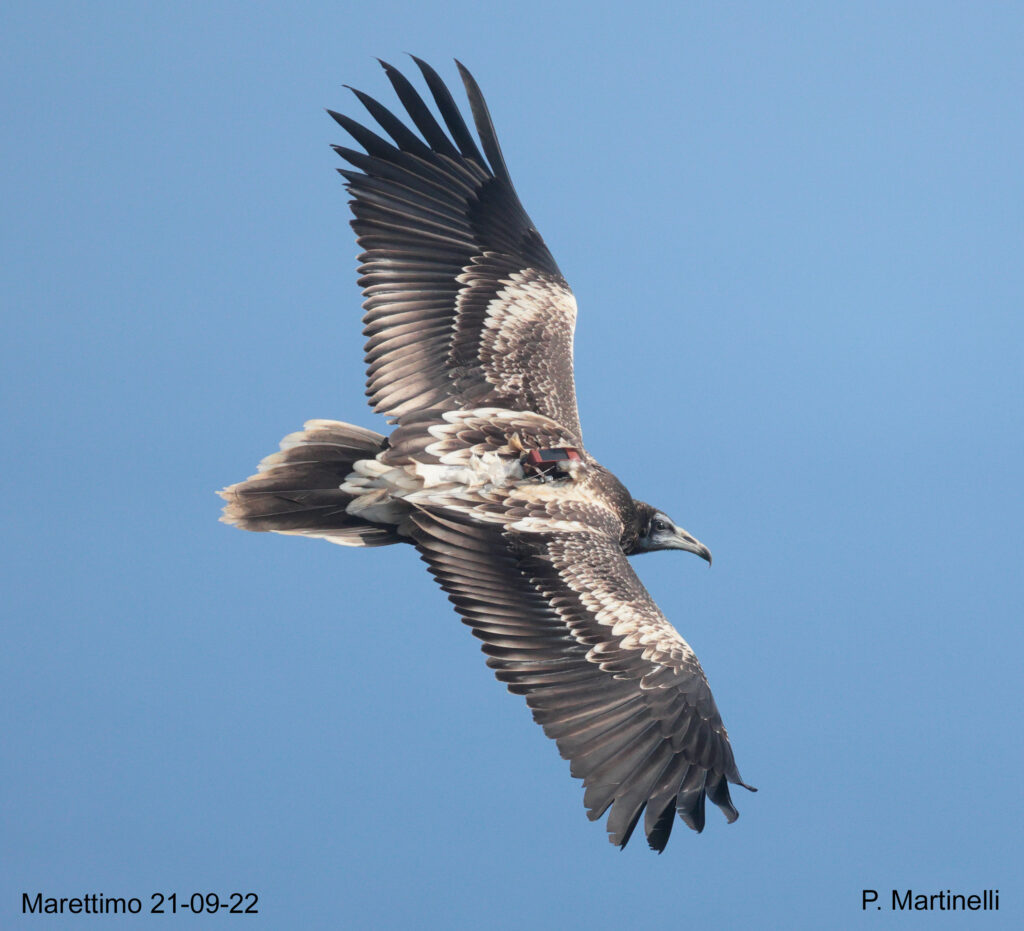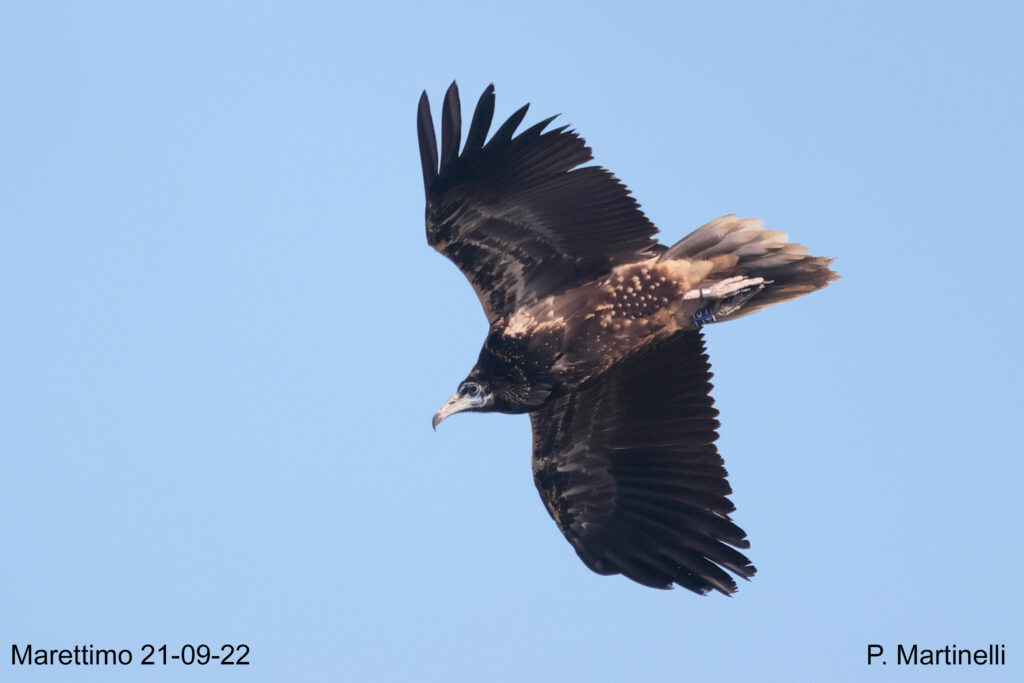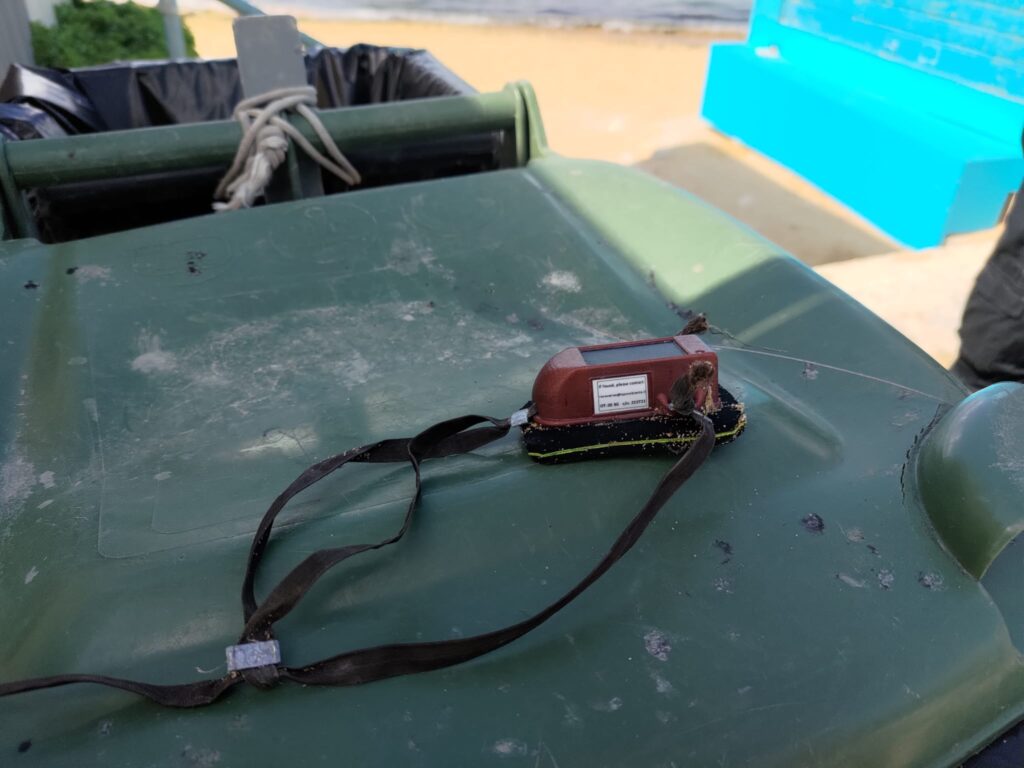Tommy, born at CERM and released in Basilicata on 16 August 2022, was most likely the victim of an act of poaching.
The young Egyptian vulture disappeared in the stretch of sea separating western Sicily from Tunisia and his story, which appears somewhat unbelievable, could be indicative of a very serious, previously unimaginable phenomenon: the poaching of migratory birds from boats.
Tommy began his migratory journey to Africa on 22 August. Having reached western Sicily, he stayed there for a few days, during which he visited a feeding point set up through ISPRA and CERM’s LIFE Egyptian Vulture Project. While in the area, he was closely monitored by a patrol of Carabinieri Forestali (Forest Rangers).
On a fair windy day on 21 September, Tommy left the island of Marettimo (Egadi) to make his way to Tunisia; he was observed and photographed in flight by photographer Paolo Martinelli. The pictures show Tommy in perfect plumage and excellent health.
After flying some 86 km southwards, his GPS recorded an abrupt and unexplained change of course in a north-westerly direction, followed by a short trajectory made at a constant speed of 20-21 km/h. Thereafter, the GPS data was no longer being received, so the young vulture’s exact location and movements could not be established.
Out of the blue, Tommy’s transmitter sent new GPS data on 26 September 2022: a location close to the island of Malta, some 337 km southeast of the previous GPS point recorded five days earlier. Alerted by the LIFE Egyptian Vulture Project Team, the Malta Police and BirdLife Malta volunteers found the GPS tracker on a Maltese beach, with the harness’s Teflon webbing, which had secured it to the vulture’s body, cleanly cut off.
All this suggests that Tommy was shot down from a boat while flying between Tunisia and Sicily, brought on board (hence the change of direction and constant speed) and ‘stored’ somewhere until his arrival in Malta. At this point, the criminals must have noticed the GPS tracking device he was carrying and, before disembarking, removed it and thrown it overboard.
The hypothetical, but probable, conclusion of this story would be the handing over of Tommy’s body to an embalmer. In Malta, poaching and illegal taxidermy are repeatedly denounced by associations dealing with this issue as a serious and internationally significant phenomenon that is not sufficiently addressed by the local authorities.
The LIFE Egyptian Vulture Team had an insight into what is happening on the island in 2021, when two of the Egyptian vultures released in Basilicata had the misfortune of arriving in Malta during migration. Isabel vanished after being the target of a ruthless vulture hunt, whereas Lucas fortunately managed to escape from a similarly ferocious attempt to kill him.
If the reconstruction of events carried out using the GPS data received is confirmed, Tommy’s death could expose a disturbing reality: the thousands of birds travelling what is the main migratory route to Africa across the central Mediterranean are at the mercy of poachers when they fly over the international waters between the Egadi archipelago and Cape Bon (in Tunisia).
This poses a very serious, and previously undetected, threat to the whole of Europe’s bird population because that route is travelled by large numbers of different species from Italy, as well as those from central, eastern and northern Europe (honey buzzards, brown kites, marsh harriers, Egyptian vultures, white storks, black storks, etc.).
In the light of what happened to Tommy, it is feared that other Egyptian vultures that have disappeared in suspicious circumstances in the same area over the years have met the same fate. One of these was Victor, who was released in 2022, along with Tommy, and disappeared a few days before him just south of the island of Pantelleria.
The authorities in charge will be asked to investigate what has happened and, if necessary, to take appropriate measures to ensure the safety of thousands of migratory birds and, in particular, the most threatened species that are likely to be selectively targeted by poachers. Indeed, the rarest species are the most valuable on the stuffed-bird market, which is flourishing in Malta. The poaching of migratory birds at sea, as well as that which occurs on the island of Malta, could undermine the efforts being made to conserve many bird species in Europe, including the Egyptian vulture.




